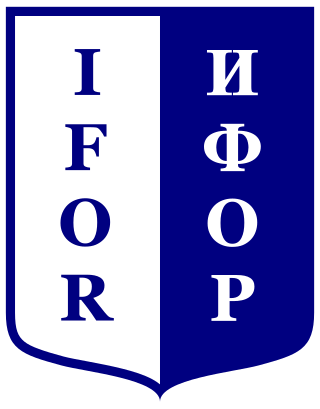
The Implementation Force (IFOR) was a NATO-led multinational peace enforcement force in Bosnia and Herzegovina under a one-year mandate from 20 December 1995 to 20 December 1996 under the codename Operation Joint Endeavour.

The Stabilisation Force (SFOR) was a NATO-led multinational peacekeeping force deployed to Bosnia and Herzegovina after the Bosnian War. Although SFOR was led by NATO, several non-NATO countries contributed troops. It was replaced by EUFOR Althea in December 2004.
Eurocorps, located in the French city of Strasbourg (Bas-Rhin), is a multinational corps headquarters. Founded by France and Germany in 1992, it is today composed of personnel from six framework nations and five associated nations. The framework nations place the Eurocorps at the service of the European Union (EU) and NATO, which certified it in 2002 as one of its nine High Readiness Land Headquarters.
The Allied Rapid Reaction Corps (ARRC) is a rapid reaction force maintained by NATO. It is capable of deploying a High Readiness Force (Land) Headquarters at short notice for operations and crisis response.
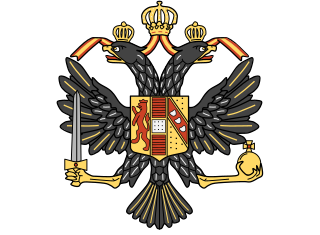
1st The Queen's Dragoon Guards (QDG) is a regiment in the Royal Armoured Corps of the British Army. Nicknamed The Welsh Cavalry, the regiment recruits from Wales and the bordering English counties of Cheshire, Herefordshire, and Shropshire, and is the senior cavalry regiment, and therefore senior regiment of the line of the British Army.
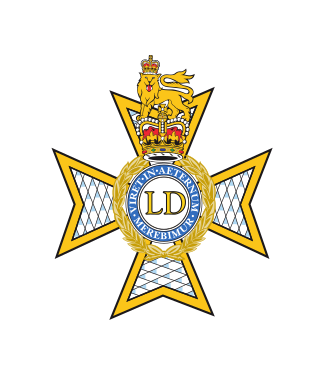
The Light Dragoons (LD) is a cavalry regiment in the British Army. The regiment has a light cavalry role and specialises in mounted and dismounted reconnaissance. The Light Dragoons recruit mainly in Northern England, from County Durham, Northumberland, Tyne and Wear, South Yorkshire and the East Riding of Yorkshire. For this reason, the regiment is known as "England's Northern Cavalry". It is currently based in Catterick Garrison, North Yorkshire.

The Queen's Regiment (QUEENS) was an infantry regiment of the British Army formed in 1966 through the amalgamation of the four regiments of the Home Counties Brigade. Then, until 1971 the regiment remained one of the largest regiments in the army, with 10 battalions, however these were reduced to just six, and later five battalions. Following the dissolution of the Soviet Union, the Options for Change reform was published and the regiment amalgamated with the Royal Hampshire Regiment to form the Princess of Wales's Royal Regiment.

The United Nations Peacekeeping Force in Cyprus (UNFICYP) is a United Nations peacekeeping force that was established under United Nations Security Council Resolution 186 in 1964 to prevent a recurrence of fighting following intercommunal violence between the Greek Cypriots and Turkish Cypriots, to contribute to the maintenance and restoration of law and order and to facilitate a return to normal conditions. Major General Ingrid Gjerde is the current Force Commander of UNFICYP, appointed in 2021, and preceded by Cheryl Pearce (Australia). Assistant Police Commissioner Satu Koivu (Finland) is the current Senior Police Adviser appointed in 2021.

The Zimbabwe National Army (ZNA) is the primary branch of the Zimbabwe Defence Forces responsible for land-oriented military operations. It is the largest service branch under the Zimbabwean Joint Operations Command (JOC). The modern army has its roots in the Rhodesian Army, which was raised between 1963 and 1964 after the breakup of the Federation of Rhodesia and Nyasaland. A Joint High Command created in March 1980 to oversee integration of the formerly belligerent Rhodesian Security Forces, Zimbabwe African National Liberation Army (ZANLA), and the Zimbabwe People's Revolutionary Army (ZIPRA) officially established the Zimbabwe National Army in late 1980, nearly a year after the end of the Rhodesian Bush War.

The United Nations Mission in Ethiopia and Eritrea (UNMEE) was established by the United Nations Security Council in July 2000 to monitor a ceasefire in the border war that began in 1998 between Ethiopia and Eritrea. First military troops Netherlands - Canadian battalion 'NECBAT' arrived and established bases in the region in December 2000.

The African Standby Force (ASF) is an international, continental African, and multidisciplinary peacekeeping force with military, police and civilian contingents that acts under the direction of the African Union. The ASF is to be deployed in times of crisis in Africa. Addis Ababa, Ethiopia, serves as the Force's Headquarters. Douala, Cameroon, was selected in 2011 as the site of the AU's Continental Logistics Base (LOGBASE).
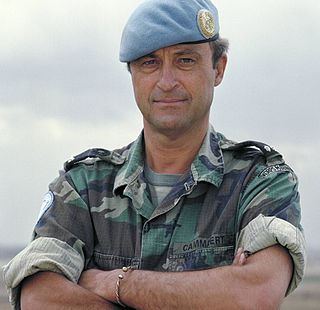
Major General Patrick Cammaert is a retired Dutch general who served as the United Nations Force Commander for the Eastern Democratic Republic of the Congo. He served since 1968 and graduated in parachuter and commando courses. He was previously the Military Advisor to the Secretary-General of the United Nations. Prior to that position, he was the Force Commander of the United Nations Mission in Ethiopia and Eritrea (UNMEE), as the Military Adviser in the Department of Peacekeeping Operations, and has spent a career in the Royal Netherlands Marines specializing in peacekeeping operations.

The Sri Lanka Army is the oldest and largest of the Sri Lanka Armed Forces. The army was officially established as the Ceylon Army in 1949, though the army traces its roots back in 1881 when Ceylon Light Infantry Volunteers was created; the army was renamed as the 'Sri Lanka Army' when Sri Lanka became a republic in 1972. In 2024, the Army had approximately 150,000 personnel.
The Report of the Panel on United Nations Peace Operations (2000) is commonly called the Brahimi Report, named for the chairman of the commission that produced it, Lakhdar Brahimi. UN Secretary-General Kofi Annan had convened the Panel on March 7, 2000, ahead of the upcoming Millennium Summit, and had tasked it with making a thorough review of United Nations peace and security activities and recommending improvements. The report was published on August 17, 2000. In identical letters dated 21 August 2000 transmitting the report to the presidents of the UN General Assembly and the UN Security Council, Annan called the Panel's recommendations "essential to make the United Nations truly credible as a force for peace."

The 282nd Armored Brigade "Unirea Principatelor" is a Armored brigade of the Romanian Land Forces, originally formed as the 282nd Mechanized Regiment on 24 September 1968 and later designated as 282nd Mechanized Brigade "Unirea Principatelor".

The Bangladesh Armed Forces and the Bangladesh Police have been actively involved in a number of United Nations Peace Support Operations (UNPSO) since 1988. Currently Bangladesh is the largest contributor in the UN peacekeeping missions.
1 German-Netherlands Corps (1GNC) is a multinational formation consisting of units from both the Royal Netherlands Army and German Army. The corps' headquarters also takes part in NATO Response Force readiness rotations. It is situated in Münster, formerly the headquarters of the German Army's I. Corps out of which 1 German-Netherlands Corps evolved. The corps has national and multinational operational responsibilities.

So far India has taken part in 49 Peacekeeping missions with a total contribution exceeding 200,000 troops and a significant number of police personnel having been deployed and more than 160 Indian peacekeepers have died serving under the UN flag as of September 2022. In 2014 India is the third largest troop contributor country [TCC] with 7,860 personnel deployed with ten UN Peacekeeping Missions of which 995 are police personnel, including the first Female Formed Police Unit under the UN. Recently Indian Peacekeepers were lauded by the UN for their efforts in preventing a carnage in the South Sudan conflict which resulted in the death of two of its soldiers.

The Eastern Africa Standby Force (EASF), formerly Eastern Africa Standby Brigade (EASBRIG), is one of the five regional forces for Peace Support Operations (PSOs) of the African Standby Force, consisting of military, police and civilian components. EASF constitutes the regional operational arm of the peacekeeping elements of the African Peace and Security Architecture, put in place by the 2002 Protocol Relating to the Establishment of the Peace and Security Council of the African Union.
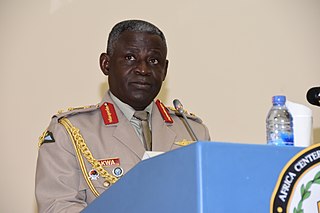
Lieutenant General Obed Boamah Akwa is a retired Ghanaian military officer who served as the Chief of the Defence Staff of the Ghana Armed Forces from February 2017 to February 2021. Prior to his appointment, he was the Chief of Army Staff of the Ghana Armed Forces.
















